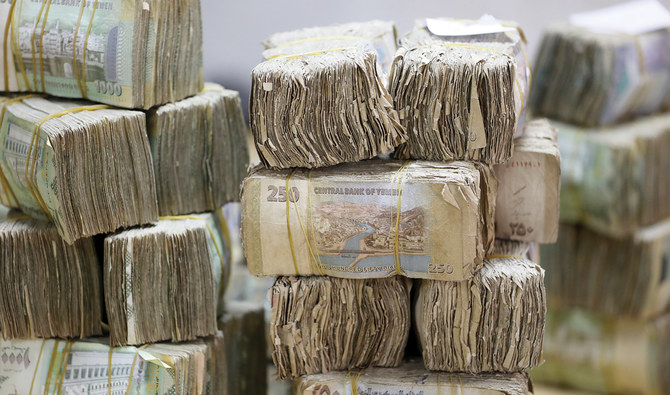AL-MUKALLA, Yemen: Prices of basic imported goods increased 10 percent in government-controlled areas of Yemen this weekend — a result of the Houthi ban on newly printed banknotes.
“Importers told us the increase is due to the fall of the Yemeni riyal against the dollar and the Saudi riyal,” Mohammed, a shop owner in Al-Mukalla told Arab News.
The Iran-backed Houthis issued a ban on the use of banknotes released by the Central Bank in Aden, saying the move is meant to stop inflation and the deterioration of the Yemeni riyal against hard currencies. The Houthis have vowed to confiscate new bills and punish traders who possess or use them.
When the Houthis issued the ban a month ago, the Yemeni riyal was trading at 600 against the dollar.
The riyal has since fallen in value to around 650, forcing local importers to increase the prices of goods, and demonstrating
how areas liberated from the Houthis are still vulnerable to their economic decisions.
Locals are also bracing for a spike in fuel prices, which usually occurs when the Yemeni riyal dives.
Since December, Houthi-controlled areas such as Sanaa and other heavily populated areas in northern Yemen have suffered from a severe credit crisis that has pushed locals to exchange new bills with scarce and damaged old ones, or converting them to the dollar or Saudi riyal.
The liquidity crisis has prompted local exchange companies to freeze government salaries, exacerbating suffering in a country that is experiencing the world’s worst humanitarian crisis, according to the UN.
“My agency managed to get rid of new notes here and there. We now only accept Saudi riyals or old bills,” a young man who runs a travel agency in Sanaa told Arab News on condition of anonymity to protect his identity.
“Traders who have a lot of new bills smuggle them inside goods to be delivered to government-controlled areas, where they’re exchanged for old banknotes.”
The dollar is traded at 580 Yemeni riyals in Houthi-controlled areas, lending weight to economists’ speculation that the decision could create two economies, derail business between liberated areas and those under Houthi control, and boost currency arbitrage on the black market.
Another repercussion of the ban is the unprecedented level of smuggling of hard and local currency between north and south.
In Al-Mukalla, local exchange companies told Arab News on Sunday that big traders in Sanaa smuggle hard currencies into liberated areas, where they are sold at higher rates.
“They buy the dollar at 580 in Sanaa and sell it here at 640,” said Abu Awadh, a worker at a local exchange company who used a nom de guerre because he is not authorized to speak to reporters. Demand for the dollar and the Saudi riyal has decreased for the first time in years, he added.
Despite an abundance of the dollar in the market, the Yemeni riyal continues to plunge. According to local traders, the reason is that currency dealers move dollars between liberated areas seeking higher rates.
The internationally recognized government in Aden, which has condemned the ban, appears powerless against its repercussions.
The Economic Reforms Team, a group of economic experts, warned that the Houthi decision could cause humanitarian, economic, social and political consequences. It urged warring parties in Yemen not to use the economy as a weapon.
















